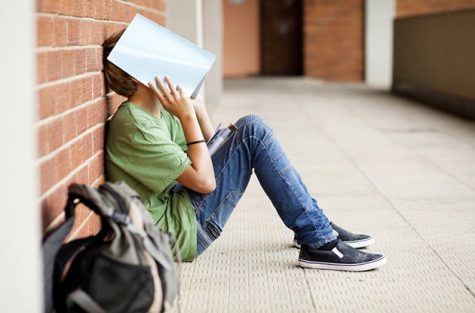“Junioritis:” a Form of Procrastination Inspired by Fear
Winter break leaves juniors procrastinating and unmotivated to work

Every student on their final leg of learning at Oakton is familiar with the idea of “senioritis.” With the end of the second quarter, most seniors have either gotten into college or finished the worst of the submission process. As the suffix implies, senioritis is a psychological affliction that infects seniors with a profound lack of motivation to complete work. After all, what’s the point? College is the future, and Oakton is rapidly fading into their past. Seniors come to school in their pajamas, skip class, and flunk tests, all because they think their futures are assured. Right or wrong, this mindset occurs in schools across the country.
There is another mindset, however, one that is spoken less about but is equally prevalent. Right around the time seniors are returning from break, healthy and rested and ready for another few months of slacking off before leaving for good, junior students are returning to a very different reality. While the stresses of junior year are a well-known issue, what’s less discussed is the student reaction to it. Where most seniors embrace their taste of freedom with open arms, happily procrastinating on work and subjects, juniors are finally forced to face the brutal reality of their situation. This is their penultimate year before college, and ahead of them is a rising mound of SAT prep, final exams, AP reading, college submissions, and extreme pressure to keep their grades afloat. “(I have) no motivation, but there’s so much work I need to do,” says Katy Noell (11). “Once I get home from sports, I’m so tired from my school day that I just want to sleep. I end up putting everything off and then just do it the next day at school, but it all makes me stressed because I don’t know if I’m gonna get everything done in time.”
To sum it up, Katy concluded her opinion on the impact of junioritis in a single word: “Bad.”
So, what does the average junior student do to survive this stressful time? Why, absolutely nothing, of course. Readers at this point will no doubt be scratching their heads, especially juniors. How can one do nothing and pass high school? To dumb it down, “junioritis” is a form of procrastination best equated to peeking around a corner and seeing a nasty monster. Instead of facing the monster, some might find it more agreeable to just mill around the corner for a bit. It’s not a months-long mindset like senioritis, a phenomenon in response to a lack of work; rather, junioritis is simply an internal resignation to drown beneath the sea of work around them.
This procrastination becomes a bad habit, and like all bad habits, it’s hard to shake. “I’ve been going on my phone more than ever,” says Ethan Edds, a junior at HB Woodlawn. Too many juniors find themselves slipping from a tendency to a mindset, until “putting off the work” becomes as natural an avoidance technique as slipping onto one’s phone to avoid social interaction. At the basis of junioritis is a true fear of what lies ahead, and it’s this fear that serves to drive the procrastination to worrisome levels.
Like all addictions, students may find that after digging themselves into a hole of late work and failed tests, shirking their load is far scarier than finishing it. And by then, it’s usually too late to pull themselves back up without assistance from a school counselor or teacher. A bit of procrastination is fine, if not healthy, but it’s a dangerously slippery slope to the junioritis affliction. Juniors should continue trying to keep their heads above water, stay ahead of their deadlines, and focus on that still-distant hope on the horizon, that beacon of promised freedom, that light at the end of the tunnel: graduation.
Hi, I'm Charlie! I'm a senior at Oakton, and I'm so excited to be an editor for my second year in journalism. My writing in journalism is mostly A&E,...





